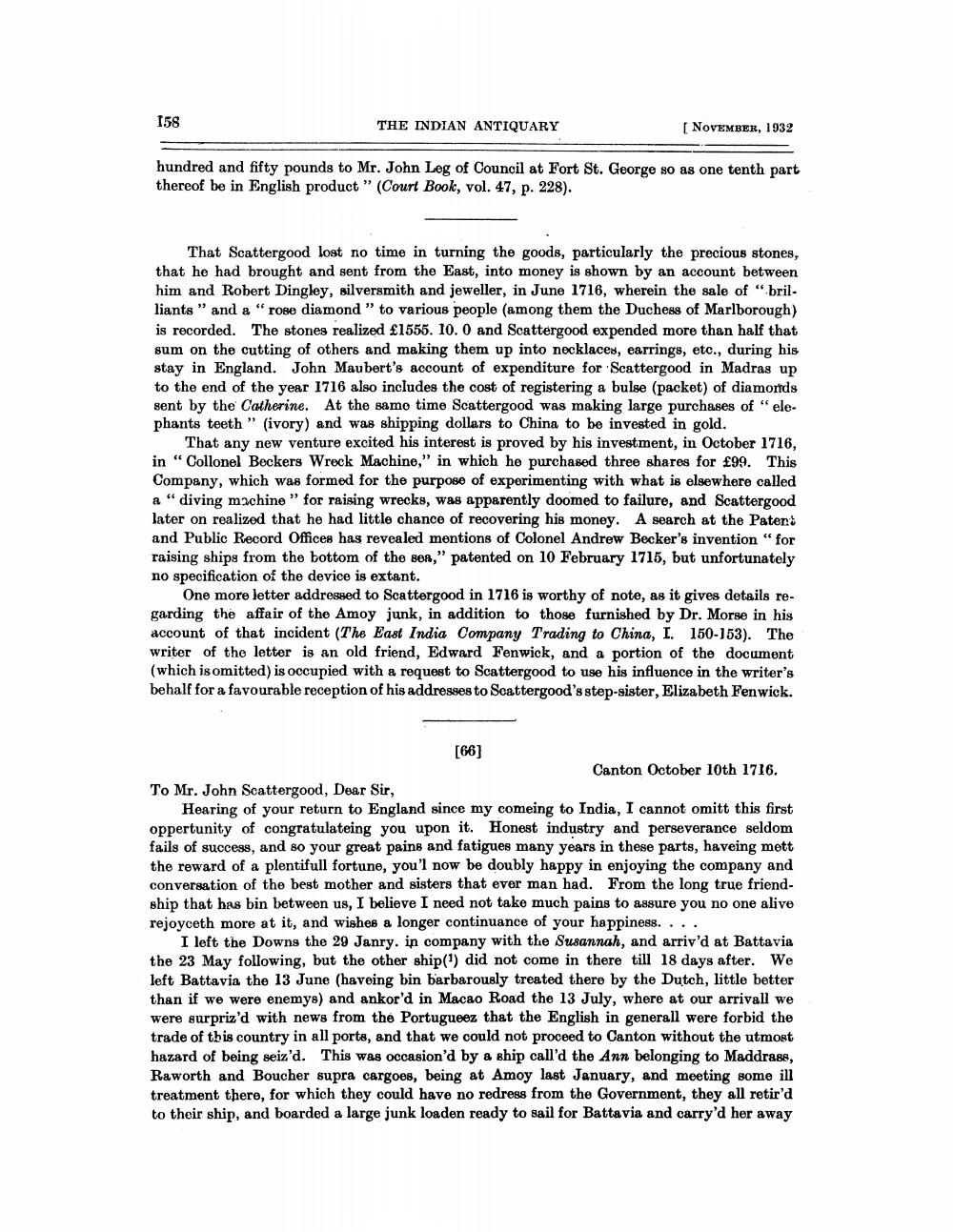________________
158
THE INDIAN ANTIQUARY
NOVEMBER, 1932
hundred and fifty pounds to Mr. John Leg of Council at Fort St. George so as one tenth part thereof be in English product" (Court Book, vol. 47, p. 228).
That Scattergood lost no time in turning the goods, particularly the precious stones, that he had brought and sent from the East, into money is shown by an account between him and Robert Dingley, silversmith and jeweller, in June 1716, wherein the sale of "bril. liants" and a "rose diamond" to various people (among them the Duchess of Marlborough) is recorded. The stones realized £1555. 10. O and Scattergood expended more than half that sum on the cutting of others and making them up into necklaces, earrings, etc., during his stay in England. John Maubert's account of expenditure for Scattergood in Madras up to the end of the year 1716 also includes the cost of registering a bulse (packet) of diamonds sent by the Catherine. At the samo time Scattergood was making large purchases of "elephants teeth " ivory) and was shipping dollars to China to be invested in gold.
That any new venture excited his interest is proved by his investment, in October 1716, in "Collonel Beckers Wreck Machine,” in which he purchased three shares for £99. This Company, which was formed for the purpose of experimenting with what is elsewhere called a " diving machine" for raising wrecks, was apparently doomed to failure, and Scattergood later on realized that he had little chance of recovering his money. A search at the Pater: and Public Record Offices has revealed mentions of Colonel Andrew Becker's invention " for raising ships from the bottom of the sea," patented on 10 February 1715, but unfortunately no specification of the device is extant.
One more letter addressed to Scattergood in 1716 is worthy of note, as it gives details regarding the affair of the Amoy junk, in addition to those furnished by Dr. Morse in his account of that incident (The East India Company Trading to China, I. 150-153). The writer of the letter is an old friend, Edward Fenwick, and a portion of the document (which is omitted) is occupied with a request to Scattergood to use his influence in the writer's behalf for a favourable reception of his addresses to Scattergood's step-sister, Elizabeth Fenwick.
[66]
Canton October 10th 1716. To Mr. John Scattergood, Dear Sir,
Hearing of your return to England since my comeing to India, I cannot omitt this first oppertunity of congratulateing you upon it. Honest industry and perseverance seldom fails of success, and so your great pains and fatigues many years in these parts, haveing mett the reward of a plentifull fortune, you'l now be doubly happy in enjoying the company and conversation of the best mother and sisters that ever man had. From the long true friendship that has bin between us, I believe I need not take much pains to assure you no one alive rejoyceth more at it, and wishes a longer continuance of your happiness...
I left the Downs the 29 Janry. in company with the Susannah, and arriv'd at Battavia the 23 May following, but the other ship() did not come in there till 18 days after. We left Battavia the 13 June (haveing bin barbarously treated there by the Dutch, little better than if we were enemys) and ankor'd in Macao Road the 13 July, where at our arrivall we were surpriz'd with news from the Portugueez that the English in generall were forbid the trade of this country in all ports, and that we could not proceed to Canton without the utmost hazard of being seiz'd. This was occasion'd by a ship callid the Ann belonging to Maddrass, Raworth and Boucher supra cargoes, being at Amoy last January, and meeting some ill treatment there, for which they could have no redress from the Government, they all retir'd to their ship, and boarded a large junk loaden ready to sail for Battavia and carry'd her away




